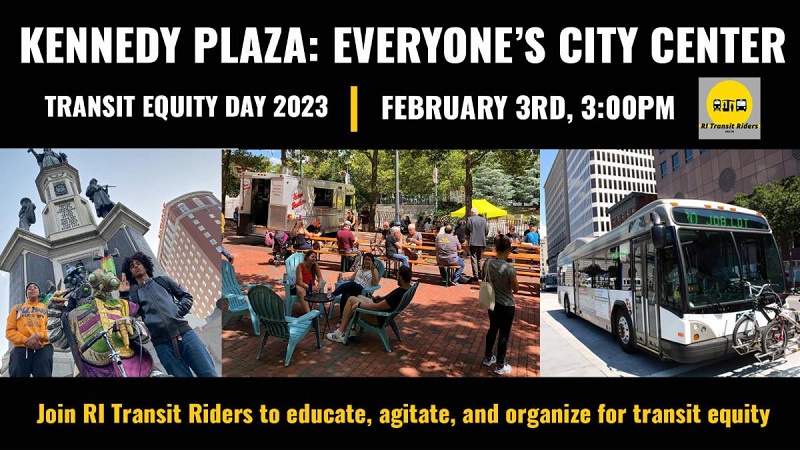EVERYONES’ CENTER CITY

Join us at Transit Equity Day on Friday, February 3, at 3 pm. This celebration of Rosa Parks’ birthday and call for transit equity for all Rhode Islanders, will take place in Kennedy Plaza by the Burnside Park fountain. Join with transit riders, climate and environmental groups, homeless advocates, city supporters, BIPOC coalitions, and unions to declare transit equity as a civil right.
Our theme this year is “Kennedy Plaza: Everyone’s City Center,” and the emphasis will be upon the Plaza’s dual role as a transit as well as a civic center. We are calling for Kennedy Plaza to continue to serve a transit function in the future for everyone even after the proposed Dorrance Street hub is completed.
There will be a brief speaking program, a visual display, and a walking tour of Kennedy Plaza.
We hope you can join us.

Snow date: February 10, same time, same place
Help us pass PIPP in 2023!
Let us know if you can join us either on Tuesdays or Thursdays from 3-4pm at the statehouse to speak to your Representative. We are approaching our representatives to recruit co-sponsors to submit PIPP in early February.
Email us if you can join us:
organize@georgewileycenter.org
With the historic utility rate increases, we need a Percentage of Income Payment Plan in Rhode Island.
PIPP would lower utility rates for seniors on fixed incomes, the disabled, low-income households, to 3-6 % of the ratepayers’ monthly income. PIPP would make it possible to better afford our bills and avoid having our utilities shut off. The Percentage of Income Payment Plan will be introduced with the same text from the last session.
(House Bill 7530)
With your support PIPP will pass this session!
PIPP is law in over a dozen states.
In Illinois PIPP lowered the heating bills for 90% elderly residents.
Every month that RI doesn’t have PIPP, low-income Rhode Islanders and seniors on fixed incomes are paying disproportionately higher utility costs.
Every year in Rhode Island over 20,000 households are put through the trauma of utility termination as a result of unaffordable bills.
PIPP would ease burdens on taxpayers by reducing utility costs on low-income consumers. Lowering the frequency of utility shut offs would reduce state expenditures by preventing costly interventions by Department of Children, Youth & Families when families’ utilities are terminated, reducing emergency hospital rooms visits due to utility terminations on people with medical conditions, preventing seniors from being prematurely forced into nursing homes when the elderly are displaced from their homes due to having their utilities shut off and other costly outcomes.
